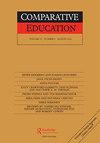‘The road less travelled’: towards a typology of alternative education in China
IF 3.7
1区 教育学
Q1 EDUCATION & EDUCATIONAL RESEARCH
引用次数: 4
Abstract
ABSTRACT In recent decades there has been an increasing number of parents opting for alternative forms of education worldwide. However, most studies on this phenomenon are conducted within Western contexts, while little is known about alternative education in China. This paper addresses this gap by providing an overview of alternative education in China over the past 20 years. This paper consists of four parts. First, we review the definition, categories, and development of alternative education in China. Second, we discuss three critical questions, namely (1) who is practising alternative education, (2) why do they choose alternative education, and (3) what is the legal status of alternative education in China? Subsequently, we develop a framework that enables us to situate different types of alternative education. Finally, we consider the phenomenon within a broader context and discuss the theoretical potential of further research into alternative education in China.“人迹罕至之路”:走向中国另类教育的类型
近几十年来,全世界有越来越多的家长选择其他形式的教育。然而,大多数关于这一现象的研究都是在西方背景下进行的,而对中国的另类教育知之甚少。本文通过对过去20年中国另类教育的概述来解决这一差距。本文由四个部分组成。首先,我们回顾了另类教育的定义、类别和在中国的发展。其次,我们讨论了三个关键问题,即(1)谁在实施替代教育;(2)他们为什么选择替代教育;(3)替代教育在中国的法律地位是什么?随后,我们开发了一个框架,使我们能够定位不同类型的替代教育。最后,我们将这一现象置于更广阔的背景下,并讨论了进一步研究中国另类教育的理论潜力。
本文章由计算机程序翻译,如有差异,请以英文原文为准。
求助全文
约1分钟内获得全文
求助全文
来源期刊

Comparative Education
EDUCATION & EDUCATIONAL RESEARCH-
CiteScore
7.40
自引率
21.20%
发文量
35
期刊介绍:
This international journal of educational studies presents up-to-date information with analyses of significant problems and trends throughout the world. Comparative Education engages with challenging theoretical and methodological issues - and also considers the implications of comparative studies for the formation and implementation of policies - not only in education but in social, national and international development. Thus it welcomes contributions from associated disciplines in the fields of government, management, sociology - and indeed technology and communications - as these affect educational research and policy decisions.
 求助内容:
求助内容: 应助结果提醒方式:
应助结果提醒方式:


